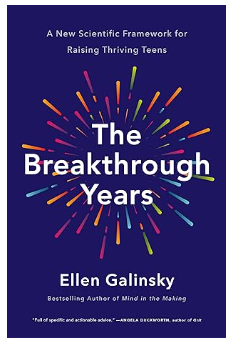






Strict Parenting? Gentle Parenting? Ellen Galinsky’s “Autonomy-Support” Alternative
Ellen Galinsky, President of Families and Work Institute and author of the classic, Mind in the Making, has a new book out just this week: The Breakthrough Years: A New Scientific Framework for Raising Thriving Teens (New York, Flatiron Press, 2024).
Galinsky spent more than a decade talking to, testing, and studying the neuroscience of kids age 9-19 to determine what makes them tick. And what makes them ticked off! And what really helps them learn and grow. She found that the war over gentle parenting vs. strict parenting misses the sweet spot of “autonomy-support” — trusting kids to figure more things out for themselves, while being there to help out, ask questions, and support their journey. This piece is adapted from her new book.
Beyond Strict or Gentle Discipline: Autonomy-Support, by Ellen Galinsky
We all have challenging moments with children—they don’t listen, they talk back, they refuse to do what we want them to do.
So, what do we do?
In the media debates, there’s no lack of advice, which seems to fall into two camps: 1) you can be strict and have rules or 2) you can be gentle and use reason.
There are some researchers, however, who have come to different conclusions. They call their approach autonomy support. Interestingly enough, these researchers didn’t set out to study parental discipline, parenting styles, or even teaching styles. Their questions were mainly about children’s learning (among younger children) and thriving (among older children).
What helps children learn?
The researchers studying younger children asked: What helps children develop executive function (EF) skills? These are the brain-based, attention-regulating skills that include:
- Working memory (using what you know)
- Cognitive flexibility (thinking flexibly to respond to changing circumstances)
- Inhibitory control (using self-control to resist going on auto-pilot in solving problems).
Reflection (pausing, paying attention to what you want to achieve before responding) is also important.
In a review of the impact of these skills, neuroscientists Adele Diamond and Daphne Ling of the University of British Columbia write that “these skills are predictive of achievement, health, wealth, and quality of life throughout life, often more so than IQ or socioeconomic status.” Phil Zelazo of the University of Minnesota says that “everything we want to do intentionally requires executive function skills for success.”
Knowing that some children and teens have better EF skills than others, Stephanie Carlson of the University of Minnesota and her colleagues wondered: What do adults do to promote executive function skills in children?
They addressed their question by bringing preschool children and their parents into their research lab and giving the children puzzles that were slightly too hard for them to do on their own. Their parents were told, “We’d like to see what your children can do on their own, but give them any help you want.”
The researchers found that parents responded in three different ways:
- Overcontrolling. They took over and did the puzzles for children.
- Under-controlling. They were uninvolved and did nothing, even when children were struggling.
- Autonomy-supportive. These parents provided help as needed but in ways that helped children learn skills for doing the puzzle. Seeing a child try to fit in a piece upside down, they might ask, “What would happen if you turned the piece around?”
The researchers found that parents of children who developed better executive function skills were autonomy supportive. In other words, the parents:
- Ensured that children took an active role (versus being controlling and solving problems for children).
- Helped children learn skills for taking on challenging situations themselves.
What helps children thrive?
A second group of researchers who tend to study older children came at their studies through a psychological theory called Self-Determination Theory. This theory, developed by Edward Deci and Richard Ryan of the University of Rochester, holds that people are motivated by inherent psychological needs. Like biological survival needs—water and food and shelter—having our psychological needs met enables us to thrive. Wendy Grolnick of Clark University calls them “nutrients required for growth, integrity, well-being.”
In studying autonomy, which decades of research has identified as a basic psychological need (along with feeling connected to others and feeling competent), Gronick has found that autonomy is not about letting children do whatever they want to do. Children, like all of us, need guidelines and limits. Grolnick defines structure as providing the information people need to feel competent—in other words, clear expectations, rules, and consistency.
One of Grolnick’s studies looks at how parents handle the transition to middle school. This study is unique in several ways. First, it followed a group of 160 students from sixth into seventh grade. Second, the measures of structure were created from students’ real-life experiences with how their parents handled studying and homework. Third, Grolnick and her colleagues didn’t just ask if structure was there or not. They also looked at whether or not the structure was provided in a controlling or in an autonomy-supportive manner.
The study found that when parents provided structure, especially in autonomy-supportive ways, the participating students were more motivated, felt more competent, and had better English grades, even when their prior feelings of competence and motivation, as well as their grades, were controlled for statistically. In other words, these parents:
- Provided rules, guidance and limits.
- Were understanding, even when they and their children disagreed.
- Discussed conflicts and problem-solved together.
- Ensured that adolescents had some say in resolving the problem.
Their studies indicate that the issue isn’t firm or gentle parenting (or teaching — because they’ve studied that too). It’s providing structure in ways that promote children’s autonomy and help them learn skills.

* This blog is adapted from The Breakthrough Years: A New Scientific Framework for Raising Thriving Teens by Ellen Galinsky (New York, Flatiron Press, 2024).



>”What do adults do to promote executive function skills in children?
They addressed their question by bringing preschool children and their parents into their research lab and giving the children puzzles that were slightly too hard for them to do on their own. Their parents were told, “We’d like to see what your children can do on their own, but give them any help you want.””
–I read this disturbingly wrong. Why should kids be assigned ANY homework they can’t do on their own. I volunteered to tutor kids who needed help in math. I did. Very rewarding because my efforts did get them to a place where they could successfully do the homework without me. I found them highly motivated, friendly, appreciative. They wanted to learn, and did. So too substituting a jr. hight advanced math class. Usually teachers know they will be taking a day off or 2. And leave worksheets accordingly. Once, in contrast, all I found were lesson plans she wrote out herself. I had time off of sorts the day before, so I reviewed and planned to teach, as she would. The students were initially dumbfounded. But then intrigued, compliant. They seemed to warm to me quickly: almost giddy they were actually learning. Not pissing their time away on insipid worksheets. In contrast, about 20 years ago, I tried to help her pubescent boy with his math. We, his assignment was beyond my capabilities, no matter how much time I spent trying to master the lesson. I’d been a math wiz, so this an odd experience for me: pointlessly embarrassing, wasteful. I felt very bad for the boy.
It’s not so much “either or”. You can be strict and have rules, and use reason, and be gentle when it’s appropriate. Any kind of cruelty, physical or emotional, is out. But it’s got to be clear that the grownups are in charge, and will not put up with childish nonsense. It pissed me off sometimes, when I was a kid, but I was a kid, needing guidance and discipline. Once I grew up, I was glad I was parented with firmness and structure, while still being allowed to be free-range and figure things out for myself.